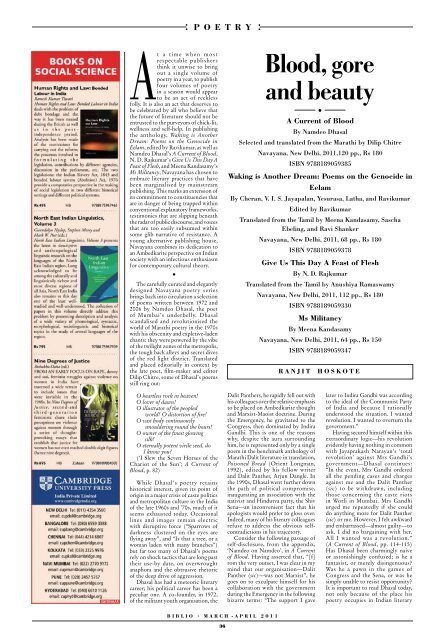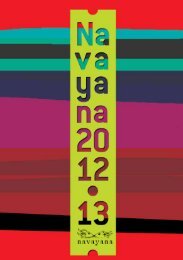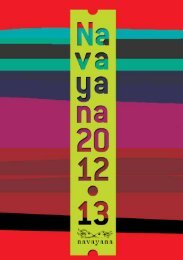Blood, gore and beauty POETRY - Navayana
Blood, gore and beauty POETRY - Navayana
Blood, gore and beauty POETRY - Navayana
You also want an ePaper? Increase the reach of your titles
YUMPU automatically turns print PDFs into web optimized ePapers that Google loves.
●<br />
●<br />
P O E T R Y<br />
●<br />
●<br />
At a time when most<br />
respectable publishers<br />
think it unwise to bring<br />
out a single volume of<br />
poetry in a year, to publish<br />
four volumes of poetry<br />
in a season would appear<br />
to be an act of reckless<br />
folly. It is also an act that deserves to<br />
be celebrated by all who believe that<br />
the future of literature should not be<br />
entrusted to the purveyors of chick-lit,<br />
wellness <strong>and</strong> self-help. In publishing<br />
the anthology, Waking is Another<br />
Dream: Poems on the Genocide in<br />
Eelam, edited by Ravikumar, as well as<br />
Namdeo Dhasal’s A Current of <strong>Blood</strong>,<br />
N. D. Rajkumar’s Give Us This Day A<br />
Feast of Flesh, <strong>and</strong> Meena K<strong>and</strong>asamy’s<br />
Ms Militancy, <strong>Navayana</strong> has chosen to<br />
embrace literary practices that have<br />
been marginalised by mainstream<br />
publishing. This marks an extension of<br />
its commitment to constituencies that<br />
are in danger of being trapped within<br />
conventional explanatory frameworks,<br />
testimonies that are slipping beneath<br />
the radar of public discourse, <strong>and</strong> voices<br />
that are too easily subsumed within<br />
some glib narrative of resistance. A<br />
young alternative publishing house,<br />
<strong>Navayana</strong> combines its dedication to<br />
an Ambedkarite perspective on Indian<br />
society with an infectious enthusiasm<br />
for contemporary cultural theory.<br />
l<br />
The carefully curated <strong>and</strong> elegantly<br />
designed <strong>Navayana</strong> poetry series<br />
brings back into circulation a selection<br />
of poems written between 1972 <strong>and</strong><br />
2006 by Namdeo Dhasal, the poet<br />
of Mumbai’s underbelly. Dhasal<br />
sc<strong>and</strong>alised <strong>and</strong> revolutionised the<br />
world of Marathi poetry in the 1970s<br />
with his obscenity <strong>and</strong> expletive-laden<br />
chants: they were powered by the vibe<br />
of the twilight zones of the metropolis,<br />
the tough back alleys <strong>and</strong> secret dives<br />
of the red light district. Translated<br />
<strong>and</strong> placed editorially in context by<br />
the late poet, film-maker <strong>and</strong> editor<br />
Dilip Chitre, some of Dhasal’s poems<br />
still ring out:<br />
<strong>Blood</strong>, <strong>gore</strong><br />
<strong>and</strong> <strong>beauty</strong><br />
●<br />
A Current of <strong>Blood</strong><br />
By Namdeo Dhasal<br />
Selected <strong>and</strong> translated from the Marathi by Dilip Chitre<br />
<strong>Navayana</strong>, New Delhi, 2011,120 pp., Rs 180<br />
ISBN 9788189059385<br />
Waking is Another Dream: Poems on the Genocide in<br />
Eelam<br />
By Cheran, V. I. S. Jayapalan, Yesurasa, Latha, <strong>and</strong> Ravikumar<br />
Edited by Ravikumar<br />
Translated from the Tamil by Meena K<strong>and</strong>asamy, Sascha<br />
Ebeling, <strong>and</strong> Ravi Shanker<br />
<strong>Navayana</strong>, New Delhi, 2011, 68 pp., Rs 180<br />
ISBN 9788189059378<br />
Give Us This Day A Feast of Flesh<br />
By N. D. Rajkumar<br />
Translated from the Tamil by Anushiya Ramaswamy<br />
<strong>Navayana</strong>, New Delhi, 2011, 112 pp., Rs 180<br />
ISBN 9788189059330<br />
Ms Militancy<br />
By Meena K<strong>and</strong>asamy<br />
<strong>Navayana</strong>, New Delhi, 2011, 64 pp., Rs 150<br />
ISBN 9788189059347<br />
RANJIT HOSKOTE<br />
O heartless rock in heaven!<br />
O lover of dawn!<br />
O illustrator of the peopled<br />
world! O distortion of fire!<br />
O vast body continuously<br />
smouldering round the hours!<br />
O owner of the finest glowing<br />
silk!<br />
O eternally potent virile seed, do<br />
I know you?<br />
(‘I Slew the Seven Horses of the<br />
Chariot of the Sun’; A Current of<br />
<strong>Blood</strong>, p. 82)<br />
While Dhasal’s poetry retains<br />
historical interest, given its point of<br />
origin in a major crisis of caste politics<br />
<strong>and</strong> metropolitan culture in the India<br />
of the late 1960s <strong>and</strong> ’70s, much of it<br />
seems exhausted today. Occasional<br />
lines <strong>and</strong> images remain electric<br />
with disruptive force (“Sparrows of<br />
darkness clustered on the eyes are<br />
flying away”, <strong>and</strong> “Is that a tree, or a<br />
woman laden with many branches”)<br />
but far too many of Dhasal’s poems<br />
rely on shock tactics that are long past<br />
their use-by date, on overwrought<br />
anaphora <strong>and</strong> the obtrusive rhetoric<br />
of the deep drive of aggression.<br />
Dhasal has had a meteoric literary<br />
career; his political career has been a<br />
peculiar one. A co-founder, in 1972,<br />
of the militant youth organisation, the<br />
Dalit Panthers, he rapidly fell out with<br />
his colleagues over the relative emphasis<br />
to be placed on Ambedkarite thought<br />
<strong>and</strong> Marxist-Maoist doctrine. During<br />
the Emergency, he gravitated to the<br />
Congress, then dominated by Indira<br />
G<strong>and</strong>hi. This is one of the reasons<br />
why, despite the aura surrounding<br />
him, he is represented only by a single<br />
poem in the benchmark anthology of<br />
Marathi Dalit literature in translation,<br />
Poisoned Bread (Orient Longman,<br />
1992), edited by his fellow writer<br />
<strong>and</strong> Dalit Panther, Arjun Dangle. In<br />
the 1990s, Dhasal went further down<br />
the path of political compromise,<br />
inaugurating an association with the<br />
nativist <strong>and</strong> Hindutva party, the Shiv<br />
Sena—an inconvenient fact that his<br />
apologists would prefer to gloss over.<br />
Indeed, many of his literary colleagues<br />
refuse to address the obvious selfcontradictions<br />
in his trajectory.<br />
Consider the following passage of<br />
self-disclosure, from the appendix,<br />
‘Namdeo on Namdeo’, in A Current<br />
of <strong>Blood</strong>. Having asserted that, “[f]<br />
rom the very outset, I was clear in my<br />
mind that our organisation—Dalit<br />
Panther (sic)—was not Marxist”, he<br />
goes on to exculpate himself for his<br />
collaboration with the government<br />
during the Emergency in the following<br />
bizarre terms: “The support I gave<br />
later to Indira G<strong>and</strong>hi was according<br />
to the ideal of the Communist Party<br />
of India <strong>and</strong> because I rationally<br />
understood the situation. I wanted<br />
revolution. I wanted to overturn the<br />
government.”<br />
Having secured himself within this<br />
extraordinary logic—his revolution<br />
evidently having nothing in common<br />
with Jayaprakash Narayan’s ‘total<br />
revolution’ against Mrs G<strong>and</strong>hi’s<br />
government—Dhasal continues:<br />
“In the event, Mrs G<strong>and</strong>hi ordered<br />
all the pending cases <strong>and</strong> charges<br />
against me <strong>and</strong> the Dalit Panther<br />
(sic) to be withdrawn, including<br />
those concerning the caste riots<br />
in Worli in Mumbai. Mrs G<strong>and</strong>hi<br />
urged me repeatedly if she could<br />
do anything more for Dalit Panther<br />
(sic) or me. However, I felt awkward<br />
<strong>and</strong> embarrassed—almost guilty—to<br />
ask. I did no bargaining with her.<br />
All I wanted was a revolution.”<br />
(A Current of <strong>Blood</strong>, pp. 114-115)<br />
Has Dhasal been charmingly naive<br />
or astonishingly confused; is he a<br />
fantasist, or merely disingenuous?<br />
Was he a pawn in the games of<br />
Congress <strong>and</strong> the Sena, or was he<br />
simply unable to resist opportunity?<br />
It is important to read Dhasal today,<br />
not only because of the place his<br />
poetry occupies in Indian literary<br />
B I B L I O : M A R C H - A P R I L 2 0 1 1<br />
36
●<br />
●<br />
g e n d e r s t u d i e s<br />
●<br />
●<br />
history, but also because his political<br />
career is a tragic cautionary tale.<br />
Waking is Another Dream is a<br />
courageous act of testimony by five<br />
Tamil poets to the genocidal war<br />
against the Tamil population of Sri<br />
Lanka. Edited by the poet, critic <strong>and</strong><br />
legislator Ravikumar—who is also cofounder<br />
of <strong>Navayana</strong>—this anthology<br />
recalls us to the horror, anguish <strong>and</strong><br />
continuing suffering of the victims of<br />
the war between the Sri Lankan State<br />
<strong>and</strong> the Liberation Tigers of Tamil<br />
Eelam (LTTE). Just as importantly,<br />
it invites us to consider the fraught<br />
(<strong>and</strong> perhaps to many readers outside<br />
Sri Lanka <strong>and</strong> Tamil Nadu, unknown)<br />
history of writings by Tamil poets <strong>and</strong><br />
intellectuals in response to the ethnic<br />
riots of 1983 <strong>and</strong> the accelerating<br />
conflict between the Sri Lankan State<br />
<strong>and</strong> Tamil insurrectionary groups<br />
in the north <strong>and</strong> east of the isl<strong>and</strong><br />
republic. In the intensely latticed<br />
world of the present, no crisis can be<br />
someone else’s alone, no predicament<br />
can exclude us. As Cheran writes, in<br />
‘The Aftermath of the Apocalypse’,<br />
transposing military violence to<br />
the cycles of ecological collapse<br />
(translated by Meena K<strong>and</strong>asamy, with<br />
inputs from Sascha Ebeling):<br />
I may be across the seas<br />
yet it rained blood<br />
on my computer screen.<br />
In this melting river engulfing me<br />
a colossal iceberg floats.<br />
On it, with wet feathers,<br />
a wounded seagull.<br />
(Waking is Another Dream, p. 24)<br />
Powerful liminalities, threshold<br />
moments of transit <strong>and</strong> transformation,<br />
are at play in the poems of N. D.<br />
Rajkumar, translated by Anushiya<br />
Ramaswamy under the title Give Us<br />
This Day A Feast of Flesh. These are<br />
poems that unsettle <strong>and</strong> provoke us,<br />
carry us into a forest of the imagination<br />
dominated by devil mothers <strong>and</strong><br />
shamans in a trance, the god of the<br />
cemetery <strong>and</strong> vampire magicians: a<br />
world that is not the fevered product<br />
of hallucination, but is really the<br />
kingdom of our own desires <strong>and</strong><br />
hatreds, our struggles for power <strong>and</strong><br />
appeals for love. Rajkumar writes, his<br />
images visceral <strong>and</strong> hypnotic, nectar<br />
mixed with poison:<br />
Dancing cobra eyes<br />
Twist into the body<br />
Striking at the corner<br />
Of the soul asleep,<br />
Sticking the tongue out<br />
On those full moon nights<br />
l<br />
l<br />
Drunk with the saliva<br />
Sucked from the dripping mouth,<br />
My poetry lies<br />
Like fragrant flowers<br />
With a tiny viper at their heart<br />
Waiting to strike.<br />
(Give Us This Day A Feast of Flesh,<br />
p. 20)<br />
Anushiya Ramaswamy provides, in<br />
her essay, ‘Where Reason is Dazzled <strong>and</strong><br />
Magic Reigns Supreme’, a theoretically<br />
sophisticated reading <strong>and</strong> meticulous<br />
contextualisation of Rajkumar’s work<br />
within the contexts of Dalit politics,<br />
Tamil poetry. She engages with his<br />
poetry through a productive mode of<br />
critical ethnography, which, far from<br />
reducing the artist to an illustration<br />
for some abstruse doctrine, permits us<br />
to underst<strong>and</strong> his art as the complex<br />
precipitate of his negotiation with<br />
multiple inheritances of conflict,<br />
multiple social <strong>and</strong> cultural arenas.<br />
“Rather than be tempted into reading<br />
Rajkumar as a dalit poet,” writes<br />
Ramaswamy, “we owe him the respect<br />
of reading him as a poet capable of<br />
showing us our deeply unequal world<br />
as a fabulous construction.” (Give Us<br />
This Day A Feast of Flesh, p. 98)<br />
l<br />
In Meena K<strong>and</strong>asamy’s Ms<br />
Militancy, we encounter a series of<br />
self-dramatisations, each the result of<br />
an acute consciousness of having to<br />
address the pressures of perception<br />
that attend poets, women, <strong>and</strong> poets<br />
who happen to be women. Sometimes,<br />
this self-consciousness summons<br />
forth a generic response, cast in the<br />
approved form of resistance essayed<br />
by numerous women poets who draw<br />
on subversive mythic exemplars while<br />
affiliating themselves to heterodox<br />
woman saint-poets from the Bhakti<br />
teaching lineages. In this spirit,<br />
K<strong>and</strong>asamy writes ‘Should you take<br />
offence...’, which serves this collection<br />
as a Preface:<br />
My Maariamma bays for blood.<br />
My Kali kills. My Draupadi strips.<br />
My Sita climbs on to a stranger’s<br />
lap. All my women militate. They<br />
brave bombs, they belittle kings....<br />
Call me names if it comforts you.<br />
I no longer care. The scarlet letter<br />
is my monogram.<br />
(Ms Militancy, pp. 8-9)<br />
Fortunately, there is a considerable<br />
current of surprise <strong>and</strong> elusiveness<br />
that does battle with the strain of<br />
predictability in K<strong>and</strong>asamy’s poetry;<br />
even when she rehearses a wellestablished<br />
choreography of feminist<br />
self-assertion, she does so with a<br />
sharp eye for detail, a grasp of worldly<br />
insight, <strong>and</strong> an appetite for phrasal<br />
shape-shifting. Her poetic personae—<br />
actors, commentators, drama queens,<br />
rebels—segue through history, cinema,<br />
television, myth <strong>and</strong> the venues of<br />
metropolitan culture. In ‘Pride goes<br />
before a full-length mirror’, she writes<br />
of the divine custodians of the old<br />
order:<br />
Some were frog-born, some<br />
dog-born,<br />
<strong>and</strong> the famous one, the mediadarling,<br />
actually carried an elephant’s head.<br />
A hatred of mirrors lent them<br />
character.<br />
They forgot to see, to foresee,<br />
to make out the shape of things to<br />
come.<br />
Sinful as scars, they sowed evil<br />
with a dozen h<strong>and</strong>s<br />
meant to be used for warplay,<br />
fairplay, foreplay.<br />
(Ms Militancy, p. 44)<br />
Far from being an indulgence,<br />
<strong>Navayana</strong>’s embrace of poetry signals<br />
its concern with amplifying the project<br />
of renovatio, ‘a making new’, the<br />
creation of new grounds for cultural<br />
action <strong>and</strong> critical discussion, the rereading<br />
of older texts <strong>and</strong> the sharing<br />
of new ones.<br />
n<br />
Market fodder<br />
Gender <strong>and</strong> Green Governance: The Political<br />
Economy of Women’s Presence Within <strong>and</strong> Beyond<br />
Community Forestry<br />
By Bina Agarwal<br />
Oxford University Press, New Delhi, 2010, 488 pp., Rs 625<br />
ISBN 0-19-806863-8<br />
Bina Agarwal’s most recent<br />
b o o k p r o v i d e s s o m e<br />
valuable insights on the<br />
gendered nature of peoples’<br />
relationship with forests,<br />
<strong>and</strong> on the implications of<br />
women’s participation in<br />
institutions of governance.<br />
But it is also marked by a series of<br />
striking silences, <strong>and</strong> underpinned<br />
by assumptions which potentially<br />
allow her contributions to be<br />
incorporated unproblematically into<br />
dominant neoliberal models of forest<br />
management.<br />
On the basis of extensive fieldwork<br />
in Gujarat’s Panchmahals, Sabarkantha<br />
<strong>and</strong> Narmada/Bharuch districts <strong>and</strong><br />
Nepal’s Baglung, Parbat, <strong>and</strong> Gorkha<br />
<strong>and</strong> Dhading districts, with further<br />
material from six other Indian states,<br />
Agarwal demonstrates how both the<br />
gender division of labour <strong>and</strong> gendered<br />
inequality of access to economic<br />
resources ensure that women’s<br />
dependence on forests is “different<br />
from, greater, <strong>and</strong> more everyday than<br />
men’s”. With “rural women …largely<br />
responsible for cooking <strong>and</strong> cattle care<br />
<strong>and</strong> for gathering fuel <strong>and</strong> fodder”,<br />
they bear the brunt of firewood <strong>and</strong><br />
fodder shortages on a daily basis. Men<br />
are affected by shortages of timber,<br />
as they are generally responsible for<br />
constructing <strong>and</strong> repairing homes<br />
<strong>and</strong> agricultural implements, but this<br />
is an occasional rather than a daily<br />
requirement. At the same time, with<br />
less control over l<strong>and</strong> <strong>and</strong> access to<br />
alternative earning opportunities,<br />
women, even those in households<br />
owning some l<strong>and</strong>, are more likely to<br />
depend on common pool resources<br />
like forests.<br />
This means that there are gendered<br />
differences in the impact of forest<br />
decline <strong>and</strong> degradation, but also in<br />
the effects of rules restricting access<br />
kalpana wilson<br />
to forests under community forest<br />
management, which have frequently<br />
meant acute firewood <strong>and</strong> fodder<br />
shortages. It also means that women<br />
<strong>and</strong> men may have different priorities<br />
for planting in the context of forest<br />
regeneration, with women prioritising<br />
fruits, fodder, firewood <strong>and</strong> nonwood<br />
products, while men prioritise<br />
species which provide timber. Further,<br />
for fuelwood, women differentiate<br />
between smoke-producing <strong>and</strong><br />
smoke-free species, highlighting the<br />
major health hazards for women <strong>and</strong><br />
children associated with cooking with<br />
wood fuels.<br />
However Agarwal emphasises that<br />
an individual’s relationship with forest<br />
resources is also crucially mediated<br />
by class differentiation within forest<br />
communities. For example, poor<br />
l<strong>and</strong>less women are more dependent<br />
on the local forest <strong>and</strong> would need<br />
more <strong>and</strong> earlier extraction from it<br />
than women from l<strong>and</strong>ed households,<br />
as well as having different priorities<br />
for planting <strong>and</strong> different uses for the<br />
same product.<br />
The book also explores questions<br />
of women’s participation <strong>and</strong><br />
representation in institutions of<br />
governance, critiquing approaches<br />
which merely advocate formal <strong>and</strong><br />
tokenistic inclusion. As Agarwal notes,<br />
exclusion of women from community<br />
forestry institutions (CFIs) frequently<br />
results not from formal exclusion but<br />
from social structures <strong>and</strong> ideologies.<br />
The gender division of labour in which<br />
women are responsible for “childcare,<br />
housework <strong>and</strong> the collection of<br />
firewood <strong>and</strong> water, in addition to<br />
their share of agricultural work <strong>and</strong><br />
cattle care” means that they face<br />
major time constraints in attending<br />
meetings. When they do, they are<br />
constrained in their participation by<br />
pressures to conform to gendered<br />
B I B L I O : M A R C H - A P R I L 2 0 1 1<br />
37




